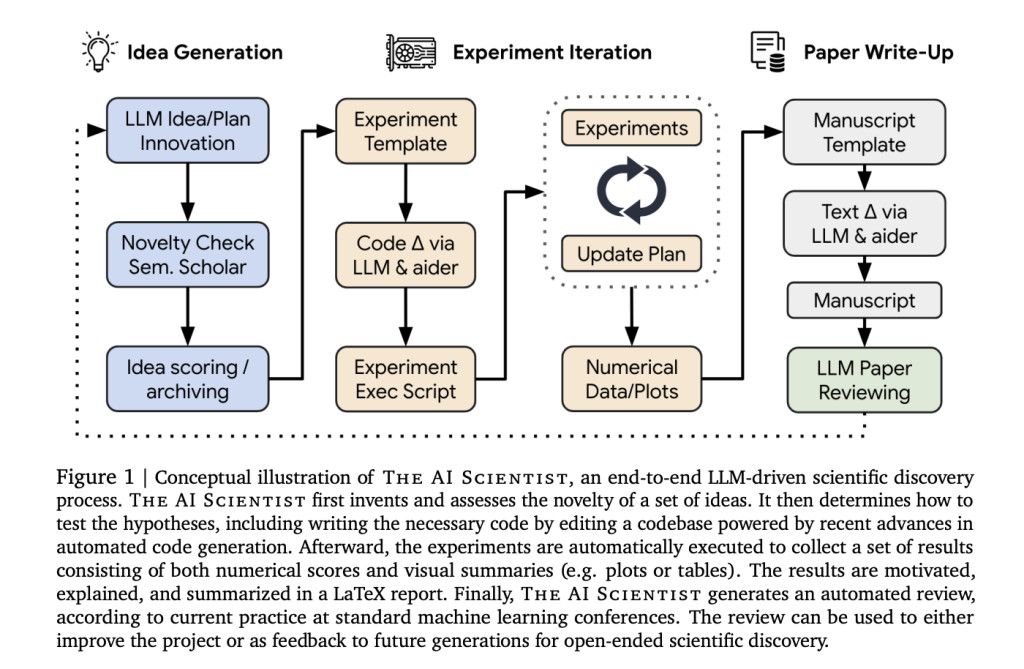Artificial intelligence (AI) has evolved into a powerful tool beyond simple automation, becoming a critical asset in scientific research. Integrating AI in scientific discovery is reshaping the landscape by enabling machines to perform tasks that traditionally require human intelligence. This evolution marks a shift towards a future where AI assists and autonomously drives scientific innovation. The goal is to develop AI systems that can independently generate hypotheses, conduct experiments, and produce scientific knowledge, ultimately accelerating the pace of discovery in various fields.
A significant challenge in this evolution is the limited capacity of current AI systems to carry out the full spectrum of scientific research autonomously. While AI has made strides in specific tasks like data analysis and experiment execution, these systems are generally constrained by human-defined parameters and require substantial human oversight. This limitation hinders the potential of AI to engage in open-ended exploration and to generate new, groundbreaking knowledge autonomously. The bottleneck lies in the inability of AI to fully integrate and automate the entire research process from ideation to publication without human intervention.
Traditional methods in AI-assisted research have focused on optimizing individual components of the scientific process. For example, hyperparameter tuning and algorithm discovery are often automated, but these efforts still need to be completed. AI systems typically perform well-defined tasks within narrowly scoped research problems, such as improving specific machine learning models or analyzing predefined datasets. However, these systems need the holistic approach needed to independently drive the research process from start to finish, limiting their contributions to incremental improvements rather than pioneering new avenues of scientific inquiry.
Researchers from Sakana AI, FLAIR, the University of Oxford, the University of British Columbia, Vector Institute, and Canada CIFAR have developed “The AI Scientist,†a groundbreaking framework that aims to automate the scientific discovery fully. This innovative system leverages large language models (LLMs) to autonomously generate research ideas, conduct experiments, and produce scientific manuscripts. The AI Scientist represents a significant advancement in the quest for fully autonomous research, integrating all aspects of the scientific process into a single, seamless workflow. This approach enhances efficiency and democratizes access to scientific research, making it possible for cutting-edge studies to be conducted at a fraction of the traditional cost.
The AI Scientist operates through three phases: idea generation, experimental iteration, and paper write-up. The system begins by generating diverse research ideas using LLMs inspired by evolutionary computation principles. These ideas are then filtered through a literature review and novelty assessment to ensure their originality and feasibility. Once an idea is selected, the AI Scientist uses a coding assistant named Aider to implement the necessary code modifications and execute the experiments. Aider executes the code and iteratively refines it based on experimental results, enhancing the robustness and reliability of the research process. Finally, the AI Scientist compiles the results into a scientific paper using LaTeX, incorporating real experimental data and citations to ensure accuracy and relevance.
The AI Scientist has demonstrated impressive performance, generating research papers that meet or exceed the quality standards of top machine learning conferences. For instance, the system produced a full scientific manuscript at an estimated cost of just $15 per paper. In evaluating these papers, the AI Scientist’s automated reviewer, based on the GPT-4o model, achieved a balanced accuracy of 70% when assessing the quality of generated research, closely aligning with human reviewers who scored 73%. The system’s ability to generate hundreds of medium-quality papers within a week underscores its potential to accelerate the research process significantly. For example, one highlighted result showed a 12.8% reduction in KL divergence in a diffusion modeling experiment, a key metric for evaluating the quality of generated data. Furthermore, the AI Scientist’s framework allowed for the continuous iteration of ideas, improving each subsequent research output based on feedback from previous experiments.
To conclude, the development of the AI Scientist marks a crucial step forward in automating scientific research. By addressing the limitations of traditional AI systems, this framework opens new possibilities for innovation across various scientific disciplines. While the current iteration of the AI Scientist shows great promise, ongoing refinements will be necessary to enhance its performance, especially in handling more complex, real-world problems. Nonetheless, the AI Scientist represents a pioneering journey towards fully autonomous, AI-driven research, offering a glimpse into a future where machines could independently drive scientific progress on a global scale.
Check out the Paper. All credit for this research goes to the researchers of this project. Also, don’t forget to follow us on Twitter and join our Telegram Channel and LinkedIn Group. If you like our work, you will love our newsletter..
Don’t Forget to join our 48k+ ML SubReddit
Find Upcoming AI Webinars here
The post The AI Scientist: The World’s First AI System for Automating Scientific Research and Open-Ended Discovery appeared first on MarkTechPost.
Source: Read MoreÂ

